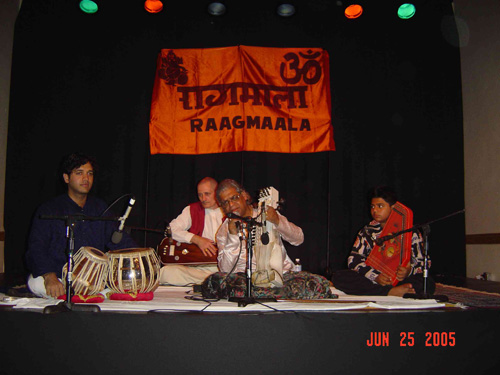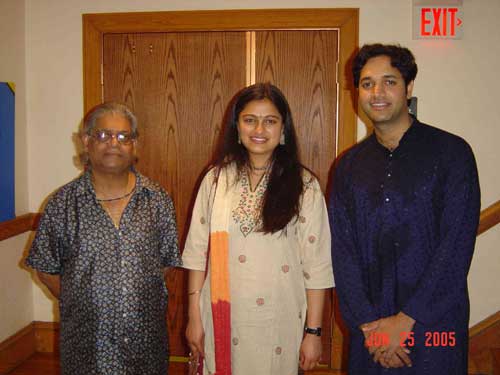Contribute
| Raagmaala - A Musical Treat In Rhode Island |
Sanjeevani Kukreja
06/29/2005
Pablo Picasso once said 'Art washes away from the soul the dust of everyday life.' The truth of this expression was experienced by the audience at the Black Stone River Theater in Cumberland RI on the 25th of June. The audience was mesmerized by the beautiful rendition of the Sarangi by Pandit Ramesh Misra with the able accompaniment of percussionist Shri Nitin Mitta. The Sarangi is an ancient relative of the European violin, which is both highly expressive and extremely difficult to play. Its name means "a hundred colors", indicating the range, depth and subtlety of its voice. The instrument expresses, according to the late Sir Yehudi Menuhin, "the very soul of Indian feeling and thought". This instrument is traditionally associated with Kathak dance and the vocal styles of thumri, dadra and kheyal. Raagmaala in association with Rhode Island State Council on the Arts organized the concert in keeping with their tradition of introducing Indian classical music not only to the second generation Indian Americans but also to the wider American audience. They work on a very simple principle according the Arun Agarwal one of the founder members of Raagmala; Music "transcends all the barriers of language". The magical evening began by Panditji playing a few solo compositions. He went on to play a few compositions in Vilambit Teental (16 beat cycle), Rupak (7 beat cycle), medium tempo Teental and the fast paced druta Teental. His rendition of the Thumri in the raag (melody) Misrangi was a revelation. His 13-year-old son who is also his student accompanied him. The second half featured a solo by Nitin who was accompanied by Panditji. In Teental he presented a few compositions and tukdas (fixed compositions) of the Farukkabad style. Nitin's accuracy and playing style had the audience captivated. In continuation of his presentation, Panditji presented the Benarasi Dadra, a folk melody of Rajasthan - Maand (reminds you of song from Lekin - Kesariya Balama Bawari Bole Log) and ended the performance with a very famous bhajan - Vaishna vajana to, a favourite of Mahatama Gandhi. Pandit Ramesh Misra's journey to the mastery over one of the most difficult string instruments started at a very early age under the tutelage of his father and he acquired further knowledge and training from finest musicians of Benaras Gharana Pandit Hanuman Prasad Mishra and late Pandit Gopal Mishra. Panditji recalls that his mother was instrumental in making him do the reyaz. Panditji has also studied under Pandit Ravi Shankar. Nitin Mitta started his formal training in table at the age of 9. His initial training was under Pandit G. SatyanarayanShri and later he took lessons from Late Shri Arvind Mulgaonkar, an exponent of Farukkabad gharana of tabla. Nitin has accompanied many eminent musicians of Indian classical music including Pandit Jasraj, Pt. Rajan and Sajan Mishra, Pt. Vishwa Mohan Bhatt, and Pandit Ulhas Bapat and now Pandit Ramesh Misra. Nitin showed the maturity and makings of a great artist. Nitin is also featured in a music album titled "Soul Strings " by Music Today. One of the charms of a live performance is the interaction between the artists. Both the artists complimented as well as supported each other extremely well. Time flew by as the music reached new heights. It felt as if the night had just begun when the concert ended about an hour and a half later. The artists were expected in NY City the next morning. Pandit Ramesh Misra is to accompany Pt. Birju Maharaji for his performance in NY. Incidentally Pandit Ramesh Misra's sister is married to Pt. Birju Maharaji. What a beautiful amalgamation in terms of relation - Kathak and Sarangi. To summarize the evening in Adeline's words, an audience member " I thought it was transcendental". "It was the incredible sounds I heard and to see their expressions as they interacted with one anther was one of the most beautiful parts" She had seen them perform at the Brown University in September and said, "So it is good to come back. I had only heard recordings before. It started something new."
When asked by this writer, what his feeling were about the audience, the soft-spoken Misraji replied, "People heard the music with a lot of love and appreciated good music." He was appreciative of the fact that even young children attended the concert. He recalled an incident at a previous concert in Washington D.C. A mother of a 2-year-old girl came up to him and said that she had bought a CD of his and played it whenever her baby cried. The music has had such a positive and calming effect on the young one that the baby girl cannot go to sleep without listening to the CD. The 2 year old had come to see the concert. Panditji's effort has always been to spread the appreciation of music and create awareness and love amongst the people for Indian music.
You may also access this article through our web-site http://www.lokvani.com/

